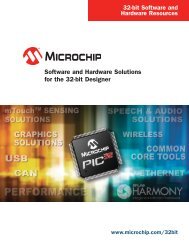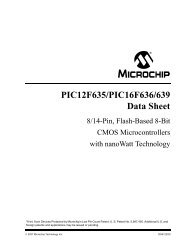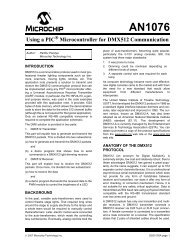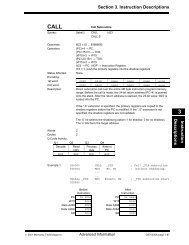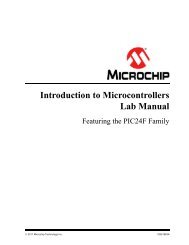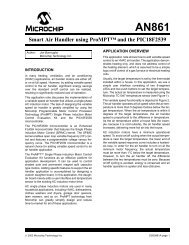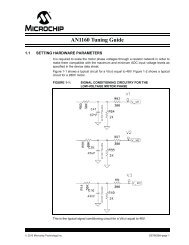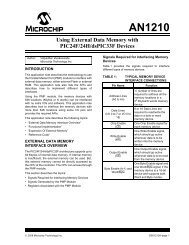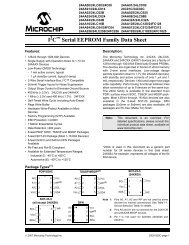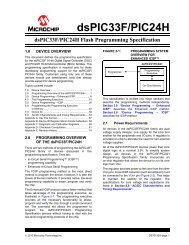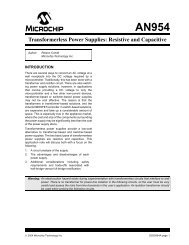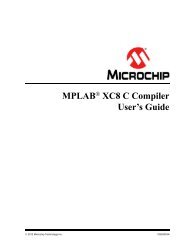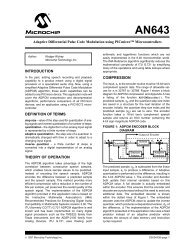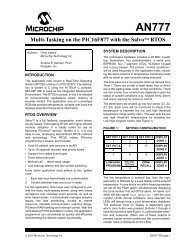MPLAB C Compiler for PIC24 MCUs and dsPIC DSCs ... - Microchip
MPLAB C Compiler for PIC24 MCUs and dsPIC DSCs ... - Microchip
MPLAB C Compiler for PIC24 MCUs and dsPIC DSCs ... - Microchip
Create successful ePaper yourself
Turn your PDF publications into a flip-book with our unique Google optimized e-Paper software.
16-Bit C <strong>Compiler</strong> User’s Guide<br />
3.5.3 Options <strong>for</strong> Controlling the C Dialect<br />
The following options define the kind of C dialect used by the compiler.<br />
TABLE 3-4: C DIALECT CONTROL OPTIONS<br />
Option Definition<br />
-ansi Support all (<strong>and</strong> only) ANSI-st<strong>and</strong>ard C programs.<br />
-aux-info filename Output to the given filename prototyped declarations <strong>for</strong> all<br />
functions declared <strong>and</strong>/or defined in a translation unit,<br />
including those in header files. This option is silently<br />
ignored in any language other than C. Besides<br />
declarations, the file indicates, in comments, the origin of<br />
each declaration (source file <strong>and</strong> line), whether the declaration<br />
was implicit, prototyped or unprototyped (I, N <strong>for</strong> new<br />
or O <strong>for</strong> old, respectively, in the first character after the line<br />
number <strong>and</strong> the colon), <strong>and</strong> whether it came from a<br />
declaration or a definition (C or F, respectively, in the<br />
following character). In the case of function definitions, a<br />
K&R-style list of arguments followed by their declarations is<br />
also provided, inside comments, after the declaration.<br />
-ffreest<strong>and</strong>ing Assert that compilation takes place in a freest<strong>and</strong>ing<br />
environment. This implies -fno-builtin. A freest<strong>and</strong>ing<br />
environment is one in which the st<strong>and</strong>ard library may not<br />
exist, <strong>and</strong> program startup may not necessarily be at main.<br />
The most obvious example is an OS kernel. This is<br />
equivalent to -fno-hosted.<br />
-fno-asm Do not recognize asm, inline or typeof as a keyword,<br />
so that code can use these words as identifiers. You can<br />
use the keywords __asm__, __inline__ <strong>and</strong><br />
__typeof__ instead.<br />
-ansi implies -fno-asm.<br />
-fno-builtin<br />
Don’t recognize built-in functions that do not begin with<br />
-fno-builtin-function __builtin_ as prefix.<br />
-fsigned-char Let the type char be signed, like signed char.<br />
(This is the default.)<br />
-fsigned-bitfields These options control whether a bit field is signed or<br />
-funsigned-bitfields unsigned, when the declaration does not use either signed<br />
-fno-signed-bitfields or unsigned. By default, such a bit field is signed, unless<br />
-fno-unsigned-bitfields -traditional is used, in which case bit fields are always<br />
unsigned.<br />
-funsigned-char Let the type char be unsigned, like unsigned char.<br />
-fwritable-strings Store strings in the writable data segment <strong>and</strong> don’t make<br />
them unique.<br />
DS51284H-page 38 © 2008 <strong>Microchip</strong> Technology Inc.



